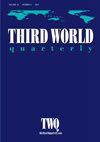Moving away from familism by default? The trends of family policies in Latin America
IF 1.8
2区 经济学
Q2 DEVELOPMENT STUDIES
引用次数: 0
Abstract
Abstract Within the care regime literature, Latin American countries have often been classified as familist or familist by default, characterised by the absence of policies to support families in the function of caring for their dependents. Drawing on novel data, this paper investigates the development of policies to support family care responsibilities for children, in Latin America, during the 2010s. Using a descriptive comparative method, it identifies an increase in the family policy effort across the region, despite favouring targeted programmes for the poor, with an emphasis in some cases on the service provisions (Chile, Colombia, and Peru) and in others on cash benefits (Argentina and Brazil). However, these efforts have been insufficient, particularly when compared to the average level of provision among Organisation for Economic Co-operation and Development (OECD) and European Union (EU) countries. We argue that only Uruguay has actually moved away from the pattern of familism by default, promoting an extensive state co-responsibility for the caring function.放弃默认的家庭主义?拉丁美洲家庭政策的趋势
摘要在护理制度文献中,拉丁美洲国家通常被默认归类为家庭成员或家庭成员,其特点是缺乏支持家庭照顾其家属的政策。本文利用新的数据,调查了2010年代拉丁美洲支持儿童家庭护理责任的政策发展情况。使用描述性比较方法,它确定了整个区域的家庭政策努力有所增加,尽管有利于为穷人制定有针对性的方案,在某些情况下强调提供服务(智利、哥伦比亚和秘鲁),在另一些情况下强调现金福利(阿根廷和巴西)。然而,这些努力还不够,特别是与经济合作与发展组织(经合组织)和欧盟(欧盟)国家的平均供应水平相比。我们认为,只有乌拉圭真正摆脱了默认的家庭主义模式,促进了国家对照顾职能的广泛共同责任。
本文章由计算机程序翻译,如有差异,请以英文原文为准。
求助全文
约1分钟内获得全文
求助全文
来源期刊

Third World Quarterly
DEVELOPMENT STUDIES-
CiteScore
4.10
自引率
15.00%
发文量
137
期刊介绍:
Third World Quarterly ( TWQ ) is the leading journal of scholarship and policy in the field of international studies. For almost four decades it has set the agenda of the global debate on development discourses. As the most influential academic journal covering the emerging worlds, TWQ is at the forefront of analysis and commentary on fundamental issues of global concern. TWQ examines all the issues that affect the many Third Worlds and is not averse to publishing provocative and exploratory articles, especially if they have the merit of opening up emerging areas of research that have not been given sufficient attention. TWQ is a peer-reviewed journal that looks beyond strict "development studies", providing an alternative and over-arching reflective analysis of micro-economic and grassroot efforts of development practitioners and planners. It furnishes expert insight into crucial issues before they impinge upon global media attention. TWQ acts as an almanac linking the academic terrains of the various contemporary area studies - African, Asian, Latin American and Middle Eastern - in an interdisciplinary manner with the publication of informative, innovative and investigative articles. Contributions are rigorously assessed by regional experts.
 求助内容:
求助内容: 应助结果提醒方式:
应助结果提醒方式:


